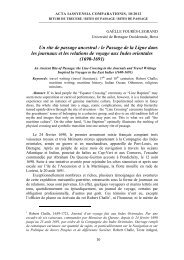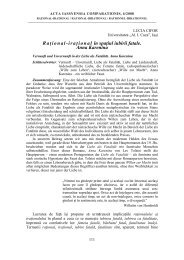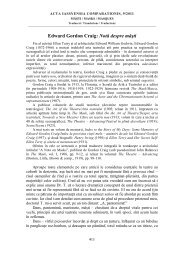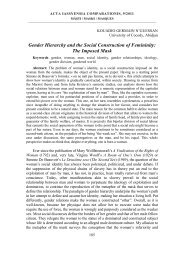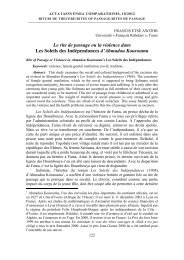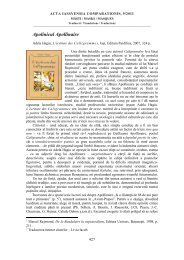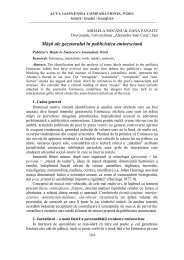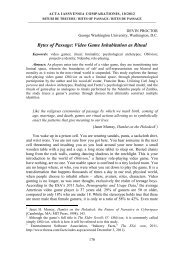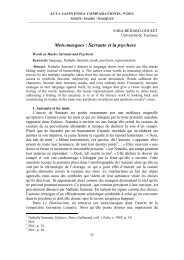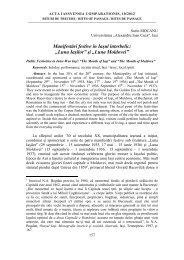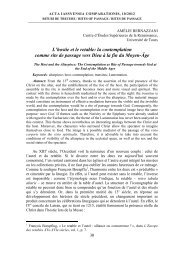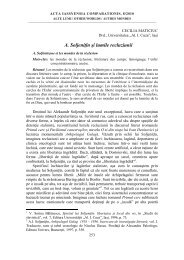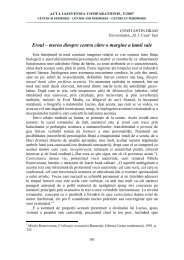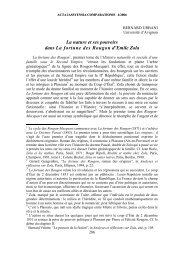Foreign Home and Familiar Abroad in Salman Rushdie's The ...
Foreign Home and Familiar Abroad in Salman Rushdie's The ...
Foreign Home and Familiar Abroad in Salman Rushdie's The ...
Create successful ePaper yourself
Turn your PDF publications into a flip-book with our unique Google optimized e-Paper software.
ACTA IASSYENSIA COMPARATIONIS, 8/2010<br />
ALTE LUMI / OTHER WORLDS / AUTRES MONDES<br />
________________________________________________________________________________<br />
black water <strong>and</strong> far away.” 1 (35). Not very much later, genu<strong>in</strong>e London for the<br />
thirteen – year – old Salahudd<strong>in</strong> translates as archetypal London, the city of the<br />
common attraction po<strong>in</strong>ts for any visitor or immigrant – “Proper London itself,<br />
Bigben Nelsonscolumn Lordstavern Bloodytower Queen. (…) Sa<strong>in</strong>tspauls,<br />
Pudd<strong>in</strong>glane, Threadneedlestreet.” (38-39) – plus some ‘moral values’: “the dream<br />
– Vilayet of poise <strong>and</strong> moderation.” (37)<br />
Salahudd<strong>in</strong>’s first trip to London, “the brave new world”, is associated with the<br />
“<strong>in</strong>terplanetary migrations”, similar to those <strong>in</strong> Asimov’s Foundation or Bradbury’<br />
Martian Chronicles. Once <strong>in</strong> Engl<strong>and</strong> where he will benefit a proper education,<br />
Salahudd<strong>in</strong> has to deny his Indian identity <strong>and</strong> the first step <strong>in</strong> achiev<strong>in</strong>g this is the<br />
symbolic rejection of his father <strong>and</strong> of all the values he symbolizes; he declares his<br />
secularity, “liv<strong>in</strong>g without a god of any type”, as the necessary premise for<br />
becom<strong>in</strong>g “a good <strong>and</strong> proper English man.” (43) Becom<strong>in</strong>g an Englishman from<br />
this perspective means endur<strong>in</strong>g all the negative English realities he has been<br />
warned about by his Indian family – “even if there was only paper <strong>in</strong> the toilets <strong>and</strong><br />
trepid, used water full of mud <strong>and</strong> soap to step <strong>in</strong>to after tak<strong>in</strong>g exercise, even if it<br />
meant a lifetime spent amongst w<strong>in</strong>ter-naked trees” (43) or “even if his classmates<br />
giggled at his voice <strong>and</strong> excluded him from their secrets” (43) – while the best way<br />
of cop<strong>in</strong>g with this is imitat<strong>in</strong>g the ones he admires – “<strong>and</strong> that was when he began<br />
to act, to f<strong>in</strong>d masks that these fellows would recognize, pale face masks, clownmasks,<br />
until he fooled them <strong>in</strong>to th<strong>in</strong>k<strong>in</strong>g he was okay, he was people-like-us.” (43)<br />
Salahudd<strong>in</strong>’s unconditioned surrender to idealized Engl<strong>and</strong> proves successful<br />
due to his adopt<strong>in</strong>g <strong>and</strong> adapt<strong>in</strong>g policy: five years later, Salahudd<strong>in</strong> becomes<br />
Salad<strong>in</strong>, “after the fashion of the English school” (45), while, by graduation time,<br />
he has already received his British passport, wish<strong>in</strong>g to cont<strong>in</strong>ue his English<br />
experience as an actor. Salad<strong>in</strong>’s career choice goes h<strong>and</strong> <strong>in</strong> h<strong>and</strong> with his identity<br />
choice: be<strong>in</strong>g an actor needs all the ‘pathos’, ‘hedonism’ <strong>and</strong> ‘disguise’ present <strong>in</strong> a<br />
migrant as well, Salad<strong>in</strong> assum<strong>in</strong>g the ‘Creator’s role’ <strong>in</strong> both directions: “A man<br />
who sets out to make himself up is tak<strong>in</strong>g on the Creator’s role, accord<strong>in</strong>g to one<br />
way of see<strong>in</strong>g th<strong>in</strong>gs; he’s unnatural, a blasphemer, an abom<strong>in</strong>ation of<br />
abom<strong>in</strong>ations. From another angle, you could see pathos <strong>in</strong> him, hedonism <strong>in</strong> his<br />
struggle (…). Or, consider him socio-politically: most migrants learn, <strong>and</strong> can<br />
become disguises. Our own false descriptions to counter the falsehoods <strong>in</strong>vented<br />
about us, conceal<strong>in</strong>g for reasons of security our secret selves.” (49) Salad<strong>in</strong>’s<br />
project of becom<strong>in</strong>g <strong>in</strong> accordance with the English st<strong>and</strong>ards <strong>in</strong>cludes lead<strong>in</strong>g a<br />
proper personal life too: he marries Pamela Lovelace, English, part of his “happy<br />
future”: “He tried to <strong>in</strong>vent a happy future for them, to make it come true by<br />
mak<strong>in</strong>g it up <strong>and</strong> then believ<strong>in</strong>g <strong>in</strong> it.” (51)<br />
Salad<strong>in</strong> Chamcha constructs his English identity start<strong>in</strong>g from mimick<strong>in</strong>g the<br />
typical English facial expression to adopt<strong>in</strong>g the English perspective upon the<br />
world. “This face was h<strong>and</strong>some <strong>in</strong> a somewhat sour, patrician fashion, with long,<br />
thick, downturned lips like those of a disgusted turbot, <strong>and</strong> th<strong>in</strong> eyebrows arch<strong>in</strong>g<br />
sharply over eyes that watched the world with a k<strong>in</strong>d of alert contempt.” (33)<br />
1 All quotes are from <strong>Salman</strong> Rushdie, <strong>The</strong> Satanic Verses, London: V<strong>in</strong>tage Books, 2006 (1988)<br />
281



